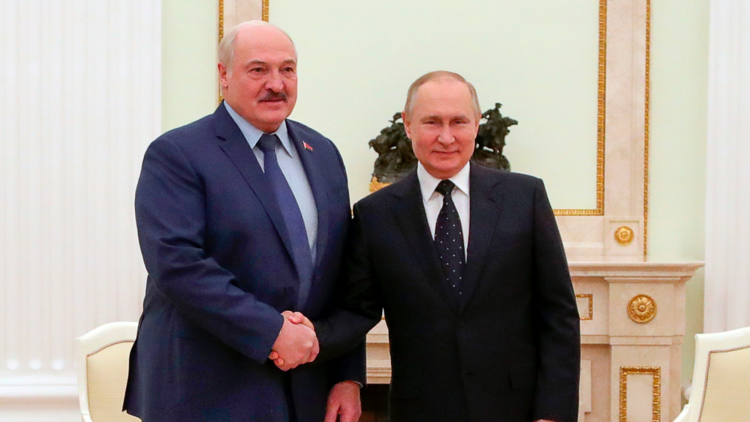War in Europe
Supplies of Troops and Equipment are Coming via Belarus

Russian President Vladimir Putin during a meeting with Belarusian President Alexander Lukashenko in Moscow, March 11, 2022.
©picture alliance / ASSOCIATED PRESS | Mikhail Klimentyev
Even if the Belarusian army has not yet actively participated in the war in Ukraine, the Belarusian ruler Lukashenko made the full brutality of the attack on Ukraine possible in the first place. The stationing of Russian troops on Belarusian soil, allegedly only as part of a military exercise, gave Russia rapid access to northern Ukraine and, above all, to the capital Kyiv. Around 100 rockets have been fired at Ukraine from Belarusian territory since the start of the war. Russian soldiers are being treated in Belarusian hospitals, and supplies of troops and equipment are also coming via Belarus.
When Russia launched an attack on Ukraine from Belarusian territory on February 24, the old constitution, which stipulated Belarus' neutrality, was still in force for a few days. Lukashenko gave up this neutrality before his “constitutional referendum” on February 27 by choosing the side of the aggressor. The Kremlin has demanded something in return for supporting the regime of Lukashenko, and the isolated ruler now has no room for political manoeuvring. Tightened sanctions following the November 2021 migration crisis pushed Belarus even further into Putin's hands; the indirect recognition of the annexation of Crimea has also destroyed the previously good relations with Ukraine. The only tactic Lukashenko can now pursue is to delay, in the now-fading hope that Russia can do without him. It can be assumed that at the meeting in Moscow on March 11, Vladimir Putin urged him to actively involve the Belarusian army in the “special operation in Ukraine”. However, Lukashenko knows that the risk for him is extremely high, not only because of further sanctions, but because his power is at stake.
According to a recent Chatham House poll, only 3 percent of Belarusians support active participation by Belarus in the war in Ukraine. The trauma of World War II, which brought terrible suffering to Belarus, is deeply embedded in the people's collective memory. Peace is also important for Lukashenko's supporters, and they probably wouldn't just accept a war of aggression against neighbouring Ukraine – despite repression and propaganda. For the elites around Lukashenko, such as the secret services and the military itself, military participation in the war cannot be a preferred option given the strength of the Ukrainian defence. And their support is essential for Lukashenko to remain in power.
The Belarusian democracy movement has sharply criticized Belarus' involvement in the Ukraine war and founded an anti-war movement. In Ukraine, which took in thousands of persecuted Belarusians after Lukashenko's rigged re-election, but also in Europe, the view is spreading that the Belarusians are Putin's allies. The attitude of the majority of Belarusians is very clear: they are against this war. Belarusian volunteers are also fighting alongside the Ukrainian army. It should not be forgotten that thousands of Belarusians who fled to Ukraine at the time have to flee again, this time not from repression but from the war. Belarusian civil society is now faced with a new difficult task: there must be no rift between the Ukrainians and Belarusians, because they are fighting together against the autocracies - for peace, democracy and freedom.
